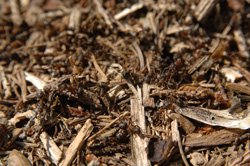 Recent research by Forest Research scientists and colleagues at the University of York shows that northern hairy wood ants (Formica lugubris) have successfully colonised plantations of largely non-native coniferous species in the North York Moors National Park. The studies show that there has been a remarkable expansion of the population of this ant into new plantations that were close to established woodlands. Published in Forest Ecology and Management, this research supports recent suggestions that non-native plantations can have positive influences on forest-dependent species.
Recent research by Forest Research scientists and colleagues at the University of York shows that northern hairy wood ants (Formica lugubris) have successfully colonised plantations of largely non-native coniferous species in the North York Moors National Park. The studies show that there has been a remarkable expansion of the population of this ant into new plantations that were close to established woodlands. Published in Forest Ecology and Management, this research supports recent suggestions that non-native plantations can have positive influences on forest-dependent species.
More than 5,500 ant nests that were mostly on the edges of coniferous plantations in the North York Moors were mapped by the project. Colonisation of the new conifer habitats was slow — the survey data showing that current wood ant populations have only extended up to a maximum of 800 metres from where forest was in the past. Nevertheless, geographical population expansions into newly formed forest suggest that the recently planted non-native conifer plantations are a suitable habitat for this forest specialist species.
The researchers suggest that the idea that a coniferous monoculture is bad for diversity should be revisited, and forest managers should not assume that unoccupied habitat is unsuitable as it may be that species have not yet had a chance to disperse to it nor should they expect to see immediate colonisation of plantations. They advise that future forest creation should be targeted close to existing woodland to facilitate colonisation by these forest specialists.
Procter, D.S., Cottrell, J., Watts, K., Robinson E.J.H (2015) Do non-native conifer plantations provide benefits for a native forest specialist, the wood ant Formica lugubris? Forest Ecology and Management doi:10.1016/j.foreco.2015.07.034
